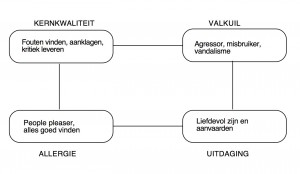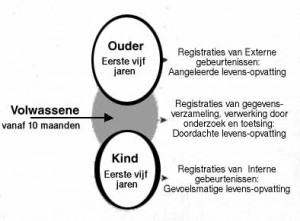Van aanklager/vervolger naar agressor
If I have to make the core quadrant for the prosecutor / persecutor sees it as follows from:
It can discover errors and deliver critical to his qualities but if you exaggerate than the aggression and it can lead to abuse, The challenge then is to be loving and accepting others, if you magnify your returns, the people pleaser who finds everything good and this is the allergy prosecutor / persecutor because he can not stand.
Codependent behavior where nothing is done to aggravate itself, so the prosecutor can be an aggressor quickly. The prosecutor finds himself right and others not so he can learn those other penalties and a lesson, criminals often think in terms of, I'm fine the other is not okay and I should therefore be abusing or killing.
The aggressor violates the boundaries of the other and does not respect the values of others and calls its own values to the other on.
The aggressor can not express his anger in a constructive way and does his fury on the other often physical violence that he justifies.
The aggressor gives the other always to blame, when he raped a woman then that was her fault because she provoked, she asked for it, he says, and takes his right and justifies his behavior.
The aggressor has no self-reflection and projects its shadow side to the other before he punishes. Rumi zei: "He does not recognize his own faults is his own enemy" and that is the aggressor, which are enmity takes out on his victims.
I am sometimes a prosecutor / persecutor, especially when I play 'now-have-I-you-up thing' again play. But I realize now that I sit in a dramadriehoekrol and then get out again quickly to make it not to physical violence or abuse are. I can think of non-violent communication and see my anger as a signal of unmet needs and my needs to the attention, though I also know that anger is sometimes necessary to give to firm your limits and not to violate.
A friend I met a man I'll call Klaas, He pointed my friend on his mistakes and showed himself a prosecutor / persecutor. He called himself paranormal and thought he was a master who had to tell the others what to think, feeling and doing. Klaas I pointed out that he could learn a lot from my friend about sensitivity, because I missed quite boorish husband at this ungainly, He contemptuously shrugged his nose at my suggestion, he learn from his victim was unthinkable for him. Klaas was the aggressor, my friend, I heard that he was arrested for sexual assault of young girls times his sessions with the girls, He is now a prison from which he might find himself completely unjustified.
We all know football hooligans who denounce the party and then shoot aggression and fight each other with chains and baseball bats to vent their anger, it is fear that these people let guided and complete unconsciousness and stupidity. Leary's Rose gives all clear that by, opposition evokes and provokes together cooperation, you have caused many reactions themselves.
The aggressor is not aware of his aggression, anger and fear, and therefore these issues are the boss over him. You're only in control of the things you know and where you are aware of, have awareness of. You can not have mastery over things that you deny and do not know…..



